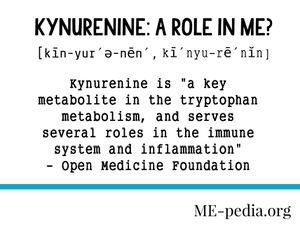Kynurenine

Kynurenine is an amino acid that is produced in the body by the metabolism of the essential amino acid tryptophan.[1][2]
ME/CFS
The Open Medicine Foundation's ME/CFS Severely Ill, Big Data Study found that patients in the study group with severe ME had one of several defects involving the IDO2 gene, which affected tryptophan - kynurenine metabolism.[3] This lead to the Metabolic Trap theory.[3]
Kynurenine is a neuroprotectant and a potential treatment. A clinical trial has been announced to investigate the effects of kynurenine, Robert Phair has stated the potential benefits of kynurenine in people with ME/CFS that may be:
- reduced brain fog
- reduced memory impairment, and
- improvements in headache symptoms[4]
Uppsala trial, Sweden
In April 2020, the Open Medicine Foundation announced a pilot treatment trial of kynurenine for ME/CFS.[5] Dr Jonas Bergquist will be running the trial.[6]
Trial type
Pilot trial, with cross-over at 3 months. Patients receiving the kynurenine will change to the placebo after 3 months, and patients receiving the placebo will switch to the kynurenine. No control group.[6]
Aims
To see whether kynurenine improves cognitive impairment (brain fog), headaches and memory in ME/CFS patients.[6]
Patients
Only 20 out of a group of 100 ME/CFS patients. Patients will be those identified as having a low level of kynurenine in blood serum and ME/CFS.[6]
Outcomes
Measurements will be taken from wearable sensors.[6]
Potential benefits
Kynurenine might be beneficial to ME/CFS patients; the Open Medicine Foundation's kynurenine trial aims to investigate this.
Suppose that some brain cells in a particular brain nucleus are in the IDO metabolic trap. This means that in those cells the concentration of tryptophan is too high, and the concentration of kynurenine is too low.Supplying an outside source of kynurenine, as Dr. Bergquist proposes, could conceivably solve part of the problem by allowing those brain cells to make the neuroactive metabolites of kynurenine that they cannot make if the metabolic trap has been sprung. So, the clinical trial might improve symptoms caused by too little kynurenine or too little kynurenic acid, a known neuroprotectant.
Dr. Bergquist's expertly designed clinical trial of kynurenine in ME/CFS to improve brain fog, memory, and headache is both important and timely.[4]
— Robert Phair, Kynurenine and the Metabolic Trap Hypothesis
Learn more
- Kynurenine - PubChem
- L-Kynurenine - PubChem
- Kynurenine clinical trial - Open Medicine Foundation
See also
References
- ↑ "Medical Definition of KYNURENINE". Merrian-Webster Dictionary. Retrieved November 30, 2019.
- ↑ National Center for Biotechnology Information (2021). "PubChem Compound Summary for CID 846, Kynurenine". PubChem Database. Retrieved January 19, 2020.
- ↑ 3.0 3.1 Phair, Robert D.; Davis, Ronald W.; Kashi, Alex A. (2019). "The IDO Metabolic Trap Hypothesis for the Etiology of ME/CFS". Diagnostics. 9 (3): 82. doi:10.3390/diagnostics9030082.
- ↑ 4.0 4.1 Open Medicine Foundation (May 26, 2020). "OMF Announces New Treatment Trial". Retrieved July 3, 2020.
- ↑ Open Medicine Foundation (May 2020). "#May Momentum 2020". Open Medicine Foundation. Archived from the original on June 21, 2020. Retrieved May 1, 2020.
- ↑ 6.0 6.1 6.2 6.3 6.4 Open Medicine Foundation (April 26, 2020). "Kynurenine Clinical Trial for ME / CFS". Open Medicine Foundation. Retrieved May 5, 2020.

